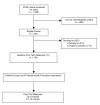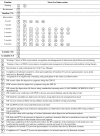Reducing depression in older home care clients: design of a prospective study of a nurse-led interprofessional mental health promotion intervention
- PMID: 21867539
- PMCID: PMC3184267
- DOI: 10.1186/1471-2318-11-50
Reducing depression in older home care clients: design of a prospective study of a nurse-led interprofessional mental health promotion intervention
Abstract
Background: Very little research has been conducted in the area of depression among older home care clients using personal support services. These older adults are particularly vulnerable to depression because of decreased cognition, comorbid chronic conditions, functional limitations, lack of social support, and reduced access to health services. To date, research has focused on collaborative, nurse-led depression care programs among older adults in primary care settings. Optimal management of depression among older home care clients is not currently known. The objective of this study is to evaluate the feasibility, acceptability and effectiveness of a 6-month nurse-led, interprofessional mental health promotion intervention aimed at older home care clients with depressive symptoms using personal support services.
Methods/design: This one-group pre-test post-test study aims to recruit a total of 250 long-stay (> 60 days) home care clients, 70 years or older, with depressive symptoms who are receiving personal support services through a home care program in Ontario, Canada. The nurse-led intervention is a multi-faceted 6-month program led by a Registered Nurse that involves regular home visits, monthly case conferences, and evidence-based assessment and management of depression using an interprofessional approach. The primary outcome is the change in severity of depressive symptoms from baseline to 6 months using the Centre for Epidemiological Studies in Depression Scale. Secondary outcomes include changes in the prevalence of depressive symptoms and anxiety, health-related quality of life, cognitive function, and the rate and appropriateness of depression treatment from baseline to 12 months. Changes in the costs of use of health services will be assessed from a societal perspective. Descriptive and qualitative data will be collected to examine the feasibility and acceptability of the intervention and identify barriers and facilitators to implementation.
Discussion: Data collection began in May 2010 and is expected to be completed by July 2012. A collaborative nurse-led strategy may provide a feasible, acceptable and effective means for improving the health of older home care clients by improving the prevention, recognition, and management of depression in this vulnerable population. The challenges involved in designing a practical, transferable and sustainable nurse-led intervention in home care are also discussed.
Trial registration: ClinicalTrials.gov: NCT01407926.
Figures
Similar articles
-
An interprofessional nurse-led mental health promotion intervention for older home care clients with depressive symptoms.BMC Geriatr. 2014 May 10;14:62. doi: 10.1186/1471-2318-14-62. BMC Geriatr. 2014. PMID: 24886344 Free PMC article. Clinical Trial.
-
Study protocol for a hospital-to-home transitional care intervention for older adults with multiple chronic conditions and depressive symptoms: a pragmatic effectiveness-implementation trial.BMC Geriatr. 2020 Jul 10;20(1):240. doi: 10.1186/s12877-020-01638-0. BMC Geriatr. 2020. PMID: 32650732 Free PMC article.
-
Nurse-led health promotion interventions improve quality of life in frail older home care clients: lessons learned from three randomized trials in Ontario, Canada.J Eval Clin Pract. 2013 Feb;19(1):118-31. doi: 10.1111/j.1365-2753.2011.01782.x. Epub 2011 Oct 26. J Eval Clin Pract. 2013. PMID: 22029487
-
Evidence Brief: The Quality of Care Provided by Advanced Practice Nurses [Internet].Washington (DC): Department of Veterans Affairs (US); 2014 Sep. Washington (DC): Department of Veterans Affairs (US); 2014 Sep. PMID: 27606392 Free Books & Documents. Review.
-
Improving the Effectiveness of Psychological Interventions for Depression and Anxiety in Cardiac Rehabilitation: The PATHWAY Research Programme Including 4 RCTs.Southampton (UK): National Institute for Health and Care Research; 2024 Sep. Southampton (UK): National Institute for Health and Care Research; 2024 Sep. PMID: 39353053 Free Books & Documents. Review.
Cited by
-
Home care assistants' perspectives on detecting mental health problems and promoting mental health among community-dwelling seniors with multimorbidity.J Multidiscip Healthc. 2016 Feb 23;9:83-95. doi: 10.2147/JMDH.S99388. eCollection 2016. J Multidiscip Healthc. 2016. PMID: 26966371 Free PMC article.
-
The Trajectory of Depressive Symptoms Across Years of Community Care Utilization Among Older Adults: A 14-Year Follow-up Study Using the 'Korean Welfare Panel Survey'.J Prev Med Public Health. 2023 Nov;56(6):495-503. doi: 10.3961/jpmph.23.022. Epub 2023 Oct 6. J Prev Med Public Health. 2023. PMID: 37871906 Free PMC article.
-
An interprofessional nurse-led mental health promotion intervention for older home care clients with depressive symptoms.BMC Geriatr. 2014 May 10;14:62. doi: 10.1186/1471-2318-14-62. BMC Geriatr. 2014. PMID: 24886344 Free PMC article. Clinical Trial.
-
The Delivery of Person-Centered Care for People Living With Dementia in Residential Aged Care: A Systematic Review and Meta-Analysis.Gerontologist. 2024 May 1;64(5):gnad052. doi: 10.1093/geront/gnad052. Gerontologist. 2024. PMID: 37144737 Free PMC article.
-
Clinical effectiveness of integrating depression care management into medicare home health: the Depression CAREPATH Randomized trial.JAMA Intern Med. 2015 Jan;175(1):55-64. doi: 10.1001/jamainternmed.2014.5835. JAMA Intern Med. 2015. PMID: 25384017 Free PMC article. Clinical Trial.
References
-
- Bruce ML, McAvay GJ, Raue PJ, Brown EL, Meyers BS, Keohane DJ, Jagoda DR, Weber C. Major depression in elderly home health care patients. Am J Psychiat. 2002;159(8):1367–1374. - PubMed
-
- Gallegos-Carrillo K, Garcia-Pena C, Mudgal J, Romero X, Duran-Arenas L, Salmeron J. Role of depressive symptoms and comorbid chronic disease on health-related quality of life among community-dwelling older adults. J Psychosom Res. 2009;66:127–135. - PubMed
-
- Preville M, Cote G, Boyer R, Hebert R. Detection of depression and anxiety disorders by home care nurses. Aging Ment Health. 2004;8(5):400–409. - PubMed
-
- Banerjee S, Macdonald AJD. Mental disorder in an elderly home care population: associations with health and social service use. Brit J Psychiat. 1996;168:750–756. - PubMed
-
- Charney DS, Reynolds CF, Lewis L, Lebowitz BD, Sunderland T, Alexopoulos GS, Blazer DG, Katz IR, Meyers BS, Arean PA, Borson S, Brown C, Bruce ML, Callahan CM, Charlson ME, Conwell Y, Cuthbert BN, Devanand DP, Gibson M, Gottlieb GL, Krishnan KR, Laden SK, Lyketsos CG, Mulsant BH, Niederehe G, Olin JT, Oslin DW, Pearson J, Persky T, Pollock BG, Raetzman S, Reynolds M, Salzman C, Schulz R, Schwenk TL, Scolnick E, Unutzer J, Weissman MM, Young RC. Depression and bipolar support alliance consensus statement on the unmet needs in diagnosis and treatment of mood disorders in late life. Arch Gen Psychiat. 2003;60:664–672. - PubMed



